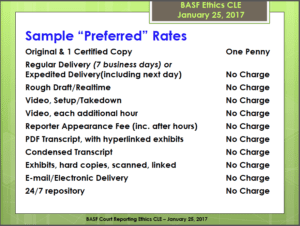 At a Bar Association of San Francisco CLE workshop on January 25, 2017: Can You Say That? Legal Ethics of Working with Court Reporters, my panel and I discussed the phenomenon known as “contracting,” among other topics.
At a Bar Association of San Francisco CLE workshop on January 25, 2017: Can You Say That? Legal Ethics of Working with Court Reporters, my panel and I discussed the phenomenon known as “contracting,” among other topics. Contracting is the controversial business practice whereby a company (usually an insurance company) enters into a preferred provider contract with a court reporting agency, where the agency gives said company set contractual rates for things like per-page deposition transcript fees. In the extreme, some large agencies offer clients “the penny transcript.”
In my 35-year career in court reporting, I have witnessed firsthand the impact of unethical or questionable business practices. Since the mid-1990s, the court reporting field has experienced the negative consequences of contracting: a nationwide shortage of court reporters.
Yet, besides contracting, where the court reporters who actually do the work have little or no say about how much they will be paid (although they are independent contractors in most states), and are short-changed their standard fees, another practice has emerged which has a similar effect: the sharing of reporters’ transcripts between two or more attorneys who represent different clients. And some of those clients are multi-million-dollar companies.
Why is it that some companies (or attorneys) think so little about the honorable practice of court reporting that they continue to undermine reporters’ ability to make a living?
Thankfully, there are attorneys who respect court reporters, pay their invoices upon receipt, and treat them as skilled legal professionals who deserve to get paid for their hard-earned work.
I happen to work with one of those. For the past year, I have been the sole legal secretary of a very busy litigator, and it’s been quite an education.
After a recent filing of a Motion for Summary Judgment that nearly killed me – 700 total pages, a 55-hour workweek and one 16-hour workday – opposing counsel (OP) sent us a new Request for Production of Documents (RFP or RFPD). I usually don’t have time to read the ream or so of documents we receive every week (via e-mail, e-service, courier or mail), but this case is interesting, so I read it. It was only three pages.
On page 2, there was a single request: Produce the deposition transcript of ___________. I laughed to myself. They were asking for their own client’s depo.
I went into the attorney’s office and asked him if he had read it.
He nodded.
“Are you going to send him a copy of the transcript?”
He shook his head.
“Are you required to produce it because he asked in an RFP?”
“No.”
He continued, “I’m going to inform him that my secretary is a court reporter, and she recently gave a workshop with Judge Woolard where they talked about the legal ethics of working with court reporters, and he can buy his own copy. Send me a link to your workshop, and I’ll take it from there.”
After contacting the court reporter to ask if opposing counsel (OP) had purchased a copy of his own client’s deposition, I forwarded her e-mail to my attorney confirming OP had not, and added:
“As you requested, here is a link to the workshop that I presented at the Bar Association of San Francisco in January about the Legal Ethics of Working with Court Reporters, which is available to purchase and view via webinar.
“Also, per CCP Section 2025.510 (h)(1): The requesting attorney or party appearing in propria persona shall timely pay the deposition officer or the entity providing the services of the deposition officer for the transcription or copy of the transcription described in subdivision (b) or (c), and any other deposition products or services that are requested either orally or in writing.”
A few minutes later, he cc’d me in his forward of my e-mail to OP, adding:
“I have your document request for me to copy my ordered and paid for transcript of your client. [My secretary], who is a certified court reporter and recently gave a BASF seminar with Judge Woolard on this and other court reporting topics, informs me what I already knew – you have to buy your own. Confirm you are withdrawing the document request, and consider this my meet and confer. I am not in a position to circumvent the Code on this issue, as it is a function of how court reporters are compensated for their services to us. I trust I have your understanding. Thanks.”
Wow. I was relieved and proud. You’d think it would end there, but it did not.
A couple of hours later, I got another e-mail from my attorney, responding to OP’s response to him (in which OP did not cc me):
“Thanks for the email. We do not seek to circumvent anything or to deprive any court reporter of their due. Defendants have offered selected excerpts of the transcript with their MSJ. Under Evidence Code § 356, Plaintiff is entitled to inquire into the entire transcript. If Defendants withdraw their excerpts, then Plaintiff will withdraw the request. Assuming that Defendants do not withdraw their excerpts, then please just advise whether Defendant will produce or decline to produce, so that it can be factored in to MSJ evaluation. We will not make it into a discovery battle.”
My attorney added in his response: “You have to pay for the transcript to the reporter. This is not a[n] Ev. Code 356 issue. ”
My respect for him grew even more, and I am grateful that there are litigators who are doing the right thing and not only not engaging in contracting or sharing copies – they are speaking up to those attorneys who do.
_______________